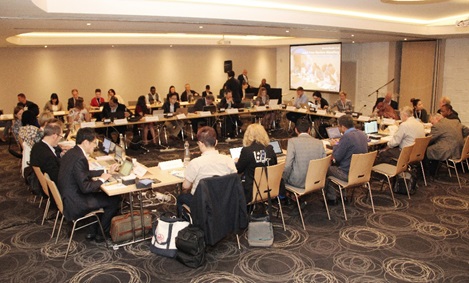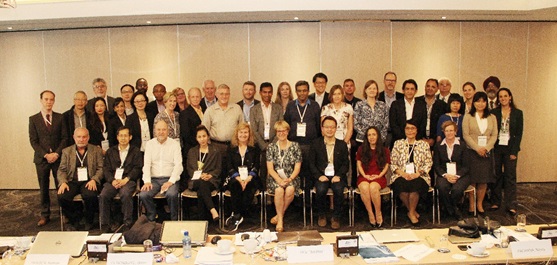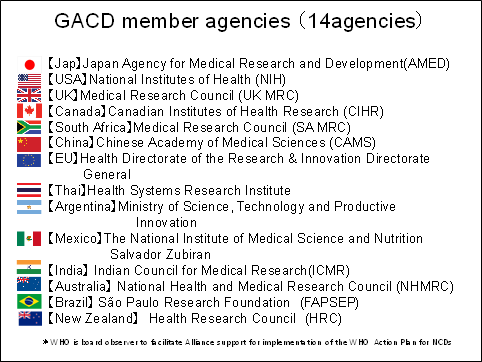AMED participated in the GACD (Global Alliance for Chronic Diseases) joint call on mental health and 2 research projects were awarded grants.
News Releases & Research Results
Key Points
- In collaboration with the Global Alliance for Chronic Diseases (GACD)※1, the Japan Agency for Medical Research and Development (AMED) implemented a joint international research call on mental health and, following an international joint peer review, selected two highly meritorious applications for funding. This was the first time for AMED to participate in a GACD joint research call.
- 11 GACD members participated in the joint call for implementation research proposals on mental health, of which 10 participated in a joint application process and peer review.
- AMED actively promotes international collaborative research activities in English and proposal review by international peer reviewers.
The Japan Agency for Medical Research and Development (AMED), whose President is Dr. Makoto Suematsu, in collaboration with the Global Alliance for Chronic Diseases (GACD successfully conducted the joint call for proposals on implementation research for the Prevention and Management of Mental Disorders in Low-and Middle-income Countries (LMICs)※2 under the AMED’s Research Program on the Challenges of Global Health Issues※3 and identified two outstanding research projects to fund. 11 public health research funding agencies who are members of the GACD participated in this joint mental health call. It was the first time for AMED to participate in the entire process of a GACD joint call since AMED became a member of GACD in June 2016.
Overview
The GACD is a collection of the world's largest public health research funding agencies (AMED became a member in 2016). Together its members aim to foster collaboration and coordination of research programmes by agreeing on joint research priorities and funding world-class implementation science research. GACD members issue joint calls for proposals on a regular basis on topics in GACD’s strategic focus areas: diabetes, hypertension, lung diseases, cancer, and mental health. Members collaboratively develop the call text, align their application process and conduct a joint peer review. The focus of the latest joint call was on mental health, which represents an ever-increasing burden globally. Applicants’ submissions to AMED focused their research proposals on mental disorders on LMICs.
AMED conducted the 1st stage review at AMED HQ, inviting applicants for an interview in English in order to screen out applications prior to the GACD joint peer review. Meritorious applications were chosen and reviewed in the 2nd stage review (GACD joint peer review). The joint review panel consisted of 30 reviewers, whose specialties spanned a variety of pertinent fields, including mental health, global health, and epidemiology. The review included a written review and scoring, and an in-person panel meeting in Cape Town, South Africa. More than 200 applications were received in total, of which 47 were discussed at the panel meeting in Cape Town, South Africa. Utilizing the results of the joint peer review, AMED awarded 2 of the highly meritorious applications (see the attached list of awarded projects).
This was the first time AMED participated in an international joint peer review since its establishment in 2015. Through participation in the joint call and peer review, AMED had access to world-class research proposals and reviewers. This enabled AMED to deepen its understanding on implementation science in LMICs, as well as identify AMED’s strengths and weakness in this field. Going forward, AMED will increase efforts to strengthen joint research calls on implementation science, and will further promote the implementation of international collaborative research projects.
Funded principle investigators and their counterparts of LMICs are invited to participate in working groups and annual scientific meetings of the GACD Research Network. The GACD Research Network allows researchers to share their learnings and research outcomes to jointly address the burden of chronic diseases.


GACD Joint Peer Review panel in Cape Town, South Africa Utilization of pictures are authorized by GACD)
- The Global Alliance for Chronic Diseases (GACD) is a collection of the world's largest public health research funding agencies. The GACD funds joint programmes into lifestyle-related or chronic diseases (cardiovascular diseases, diabetes, certain cancers, lung diseases and mental health). The alliance coordinates and supports research activities that address the prevention and treatment of chronic non-communicable diseases, on a global scale. These conditions account for 60 percent of deaths globally. The GACD's multi-country, multi-disciplinary research focuses in particular on the needs of low- and middle-income countries, where 80% of deaths from chronic diseases occur. The alliance also focuses on research with vulnerable populations of more developed countries. The GACD is the first collaboration of major research funding agencies to specifically address chronic non-communicable diseases. Together, the members of the alliance represent over 80% of public health research funding worldwide. The GACD is now made up of fourteen public health research funders from around the world. AMED became the member of GACD in June 2016. Dr. Makoto Suematsu, AMED president, is a GACD Board member.
-

- ※2 GACD joint call:Prevention and Management of Mental Disorders
- Since its formation in 2007, GACD has implemented four joint calls for implementation science research proposals on diseases within its strategic focus areas. GACD joint research calls to date:
- 1st joint call: Hypertension (2010)
- 2nd joint call: Type 2 Diabetes (2013)
- 3rd joint call: Chronic lung diseases (2014/15)
- 4th joint call: Mental health (2017)
- 5th joint call: Scale-up (TBD)
AMED participated in the 4th joint call on mental health. Mental conditions represent an ever-increasing burden affecting all age groups within a population, challenging national health systems. For example, depression affects 350 million people in communities across the world and represents the third leading contributor to the global disease burden. Recently, WHO has issued global health policies and guidelines on mental health, and mental health was included in target 3.4 of the Sustainable Development Goals (SDGs). This demonstrates the growing global interest in mental health.
Not including the mental health call, GACD currently funds 600 researchers in 40 countries.
- ※3AMED’s Research Program on the Challenges of Global Health Issues
- This program promotes research related to global public health issues (infectious disease control, maternal and child health, universal health coverage, aging populations, lifestyle-related diseases, etc.) in areas such as disease etiology, disease prevention, and standardizing methods of diagnosis and treatment. It aims to contribute to global health by taking advantage of advanced science and technology, and knowledge and experiences which have been accumulated in our country. The program also aims to enhance the global cooperation in health research. Achievements and findings of this program are expected to be instrumental for international organizations in developing global policies and principles.
AMED’s membership in GACD is based on this program and enables AMED to participate in collaborative, world-class research in implementation science.
URL
AMED
- Research Program on the Challenges of Global Health Issues
- News release on AMED joining the Global Alliance for Chronic Diseases (GACD) as a newest member. (29 June, 2016.)
GACD Website
The Global Alliance for Chronic Diseases (GACD) - an alliance of health research funders leading research collaborations on chronic diseases worldwidList of Awardees
| Project | Principal Investigator | Affiliation | Project Overview |
|---|---|---|---|
| Mental health promotion at workplace in low- and middle-income countries in Asia |
Norito Kawakami | Professor, Graduate School of Medicine, The University of Tokyo | With rapid aging in many Asian countries, health care professionals face higher demands at the workplace, which increases their stress levels. The project aims to develop stress management programs and test their effectiveness among health care professionals in Vietnam. |
| A Study on Rights-based Self-learning Tools to Promote Mental Health, Well-being & Resilience after Disasters | Yoshiharu Kim | National Center of Neurology and Psychiatry, Japan Director of Department of Adult Mental Health, National Institute of Mental Health / President of National Information Center for Disaster Mental Health | Despite an increasing number of natural disasters, most south-east Asian countries lack mental health care resources. This study examines the efficacy of an e-learning version of the WHO's “Psychological First Aid (PFA)" in countries such as Malaysia. |
Contact
Japan Agency for Medical Research and Development (AMED)
Division of International Collaboration, Department of International Affairs
Tel : +81-3-6870-2215
E-mail : chikyukibo"at"amed.go.jp
※Replace”at”with @.
11/24/17
Last updated 11/24/17

